Regenerating the ocean by listening to the sea and the locals who call it home
In 2016, Sulubaaï Foundation, a Filipino-French NGO based in Palawan, established a small 4.5-hectare island named Pangatalan as its first Marine Protected Area dedicated to conserving marine life and ecosystems.
Fast forward to 2025, the foundation’s work has expanded into a community-led network of MPAs that gained international recognition for its exceptional marine biodiversity conservation efforts.
The Shark Fin Bay MPA Network, now comprising five MPAs, was awarded a gold-level Blue Park Award presented by the Marine Conservation Institute during the 3rd UN Ocean Conference in Nice, France, on June 12, 2025. Home to flourishing tropical coral reefs, seagrass meadows, and mangrove forests, it’s now the fourth Blue Park in the Philippines, following Siete Pecados Marine Park in 2024, Apo Reef Natural Park in 2022, and Tubbataha Reefs Natural Park in 2017.

According to the Marine Conservation Institute, a Blue Park is an MPA that meets the highest science-based standards for conservation effectiveness. With Shark Fin Bay MPA network’s newfound accolade, it’s now part of a growing global network of 34 awarded Blue Parks that serve as exceptional models for marine conservation.
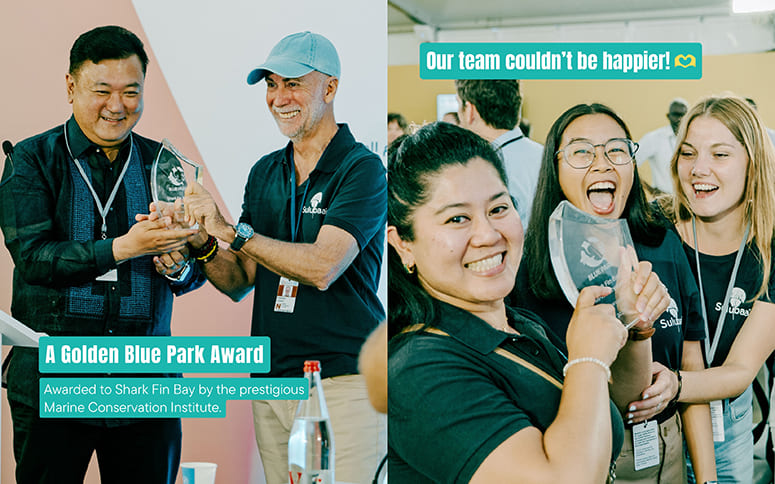
“While the award is a source of pride and motivation, it’s not just about Sulubaaï,” says Conservation Officer Kim Mamburam. “It proves how local Filipino communities, when respected, collaborated with, and truly included, can lead effective and globally-recognized conservation efforts.”
Their approach? Listen to the sea—and the locals who call it home.
A bay reborn through persisting in its potential
While Pangatalan Island was established as an MPA in 2016, the foundation began its restoration in 2011 when it was heavily degraded from overfishing and unsustainable practices.
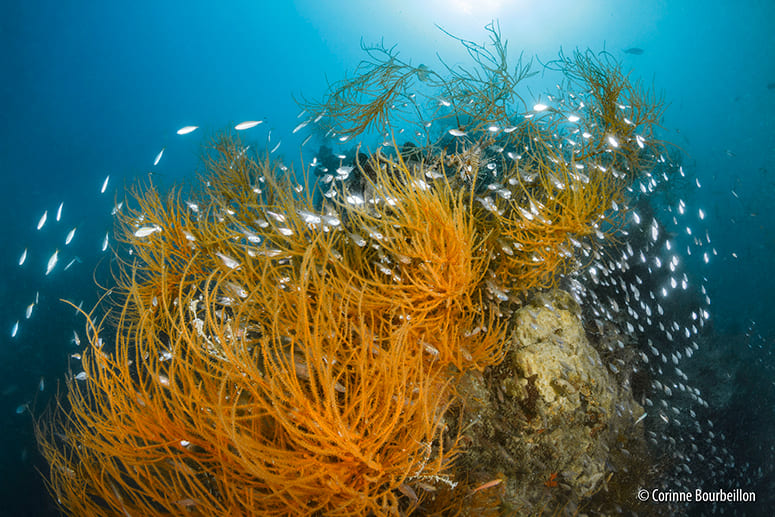
With the engagement of local government units, the island became a testbed for science-based restoration. Increases in fish density, biomass, and size within the protected area were observed, garnering results that surpassed those of unprotected sites nearby.
Upon witnessing Pangatalan Island’s success, local communities committed to establishing their own MPAs in partnership with the foundation. Through their collaboration, Shark Fin Bay MPA Network now spans 9 square kilometers of five key MPAs: Pangatalan Island, Depla, Sandoval, Silanga, and Batas, the newest addition from 2025 known as “Little Tubbataha” for its remarkable coral reefs.
How resistance transformed into stewardship
Whereas MPAs are declared top-down by LGUs in most municipalities across the Philippines, Sulubaaï Foundation flipped the script by seeking community insights first.
“We begin by consulting with the communities,” Kim explains the team’s ground-up approach. “We conduct surveys, hold public hearings, and make sure that communities see the benefits of protecting the oceans before any MPA is declared.”
Initial skepticism is expected, as fishers fear losing their livelihoods. But through Information, Education, and Communication campaigns and concrete data, such as photos of coral regrowth or increases in fish stocks, resistance acquiesces to support.
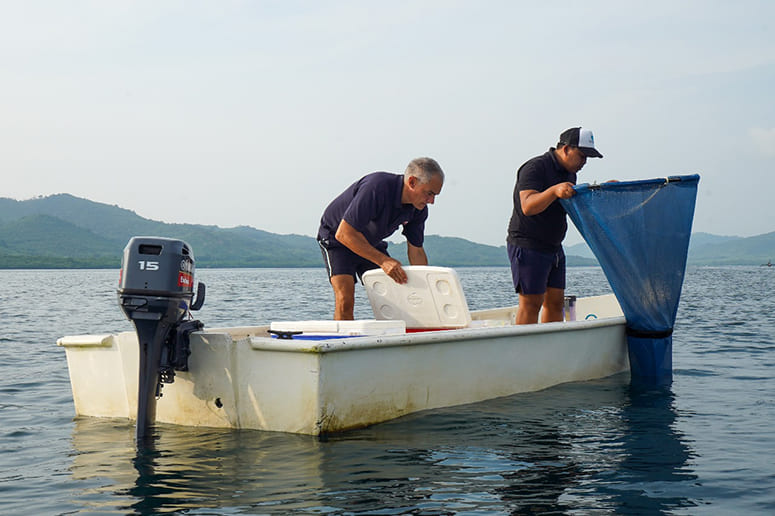
Aquaculture Manager Ernesto “Junjun” Respecia, whose childhood was influenced by living near the sea with parents who are fisherfolk, deeply understands this perspective. “They start to believe in it when they see more fish even outside the MPAs. That’s the spillover effect working in real time,” he says.
“We even invite community leaders to visit successful MPAs,” Kim shares. “Seeing is believing. When they witness how clear the water is or how many fish there are, they become believers and advocates of the cause.”

Once established, each MPA is patrolled by rangers called Bantay Dagats, a diverse collective of locals who are dive masters, rescue divers, or fishers themselves. Serving as citizen scientists, these volunteers not only enforce boundaries and monitor illegal fishing but also collect data to support regeneration efforts.
Apart from boosting fish stocks, another key benefit of establishing MPAs is introducing alternative livelihood programs for fisherfolk, who learn new skills and generate income through sustainable means like responsibly-managed fish cage farming.
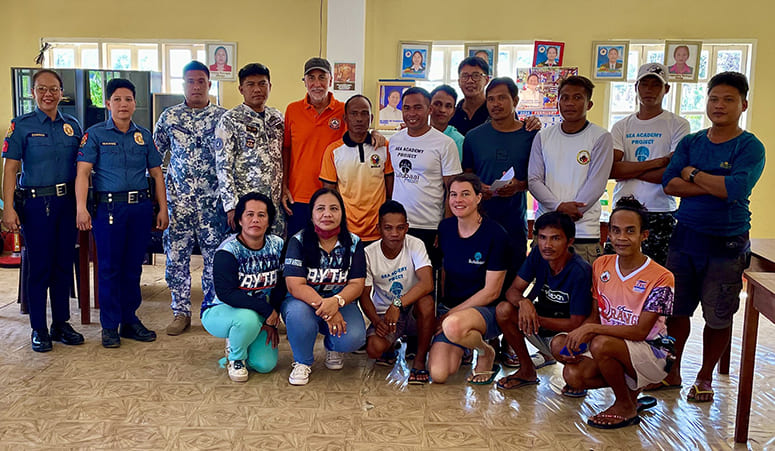
Youth and locals as the custodians of tomorrow
The Sea Academy Project (2020–2024) helped establish MPAs through community partnerships and brought marine education to schools through lectures, coastal clean-ups, and habitat assessments.
Its current program, Sea Academy+ (2025–2028), expands previous efforts by extending conservation initiatives into Taytay Bay, with locals at the core. It also prioritizes training senior high school students in citizen science and supporting them in their own marine research in Shark Fin Bay.
Through programs that educate within and beyond the classroom, more young people are equipped to be the next generation of conservation leaders.
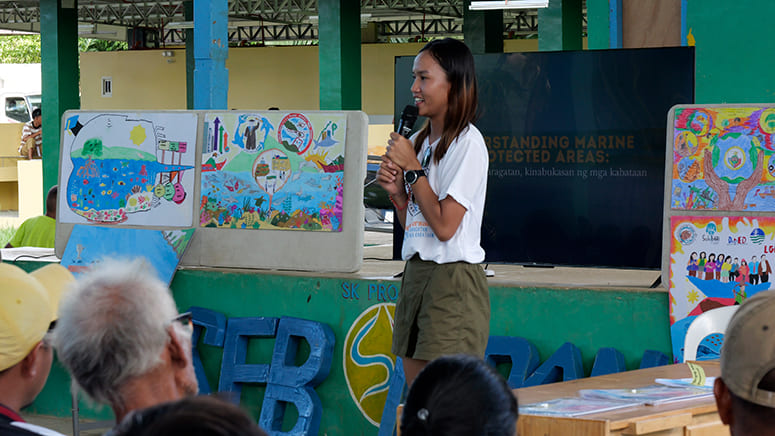
“The youth aren’t just passive participants,” says Kim. “They’re becoming community leaders, researchers, and storytellers.”
Anchored in the mission amid rough waves
The team remains determined despite financial constraints, a challenge typically faced by NGOs. “We need partners,” Junjun says, calling for collaborators, advocates, and storytellers. The foundation is also working on sustainable tourism initiatives.
“If you truly care about the ocean, you protect it and the people who depend on it. Fishers are among the most vulnerable, yet they provide us with food and rely on the sea for their livelihood,” Kim says, encouraging people to be responsible citizens and allocate resources when able.
“What’s happening in the ocean reflects our actions. If it’s suffering, it means we’re doing harm. If it’s thriving, it means we’re doing something good — for the sea and for ourselves,” says Kim.
***
To support the Sulubaaï Foundation’s work, visit their website or follow them on Facebook and Instagram.


